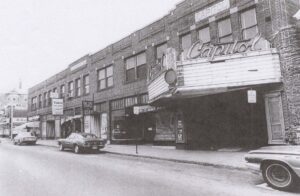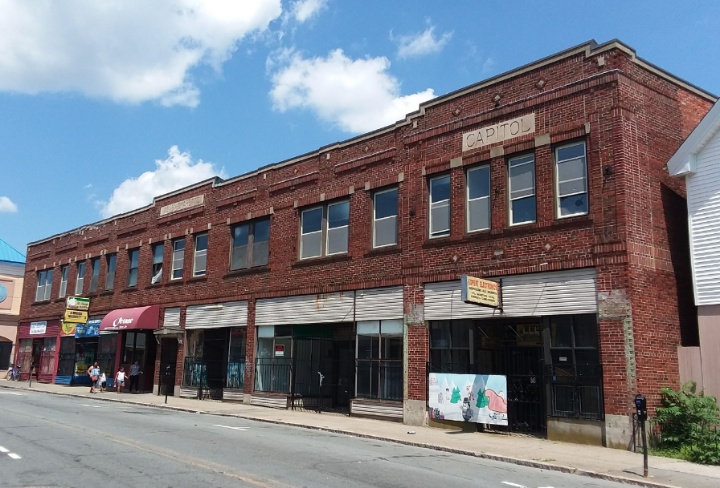By Steven Froias
NEW BEDFORD, MA – There may be no building more poignant on the urban streetscape than a former movie theater shorn of its original purpose and left to fend for itself in a world which has relegated it to oblivion.
These noble structures dot the landscape of cities across America as symbols of obsolescence – yet retain a powerful hold on the collective imagination and help form the emotional infrastructure of any given place.
The former Capitol Theater in New Bedford, Massachusetts is just such a building. Its position in the city’s history as a destination location and community incubator on the commercial corridor Acushnet Avenue is legendary.
But its role into the future has long been in doubt.
Until now.
THE CEDC BUYS THE CAPITOL THEATER
The Community Economic Development Center (CEDC), a non-profit organization dedicated to enabling opportunity for all segments of society, recently purchased the former Capitol Theater at 1140 Acushnet Avenue. The CEDC has entered into a partnership agreement with Waterfront Area Historic League (WHALE), which will rehabilitate the building for adaptive reuse. Together, the two will return it to center stage in the civic life of the City of New Bedford.
The project will see the Capitol Theater property repurposed into office space, affordable housing units, street level retail and a new home for the CEDC with enhanced economic development and vocational programming. When complete, the $5.7 million project will prove transformative in scope for this revitalizing north end neighborhood.
“There’s a reason theaters occupy a hallowed place in preservation history,” explains WHALE Executive Director Teri Bernert. “They were and are centrally located to have maximum impact on a city’s commercial and cultural well-being. The Capitol Theater is a perfect example of that in the past, and now into the future.”
An initial feasibility study for the project was funded with a Local Initiatives Support Corporation grant. LISC is one of the country’s largest organizations supporting projects to revitalize communities and bring greater economic opportunity to residents, according to its website, lisc.org.
The architectural firm, studio2sustain also performed two feasibility studies funded by the New Bedford Economic Development Council. Architect Kathryn Duff, founder of the firm, concluded that the building was not only structurally worthy of renovation, but desirable from a redevelopment standpoint, too. Its future financial prospects scored high.
When the economic resilience of the property was judged sound, the CEDC then secured Community Preservation Act Funding in 2019 in the amount of $350,00 to help purchase the Capitol building, which sold for $450,000. The application for CPA funding was the first in the City of New Bedford to utilize those funds for a project that includes affordable housing.
REPURPOSING HISTORY FOR THE FUTURE
WHALE’s mission is to foster historic preservation and continued use of the city’s architectural heritage to enhance community and economic vitality in New Bedford. The non-profit development corporation accomplishes this through the restoration and reuse of historic structures which provide commercial development, affordable housing to low and moderate income individuals and families, promotes arts and culture, and educates on the importance of the historic and architectural culture of New Bedford’s diverse people.
The Community Economic Development Center, currently located at 1285 Acushnet Avenue, fosters economic justice in the local economy through people-centered development, with a focus on community members who have recently immigrated here. They connect youth and adults to skill-building opportunities and resources. They also help foster community networks and collaborations to promote cooperative action for social change. The CEDC will relocate to a refurbished Capitol and expand their efforts when construction is complete.
“Ensuring that everyone in New Bedford is engaged in every facet of its economic and civic life is our primary goal,” says Corinn Williams, Executive Director of the CEDC. “With this project, we can realize that mission for years to come while anchoring Acushnet Avenue in the city’s future as well as its past.”
Preliminary plans include offering a mix of programs in an opportunity center that can accommodate demand and meet the needs of the diverse north end population. Uses under consideration for this center include textile and culinary incubator spaces, arts and culture studios and workshops, and vocational training programs in Spanish.
The greater Acushnet Avenue neighborhood has a large population of Central American, Latino and Hispanic residents who have brought a new vitality to the commercial corridor. The non-profit organization, Migrant Education Program, which currently shares space with the CEDC, will move into the building, too. So will Groundwork Southcoast, a group with a shared values mission.
The renovated building will also include six retail storefronts and six affordable apartments. Several of the retail locations have already drawn interest; future tenants may include a Vietnamese restaurant and an attorney’s office, joining an existing bodega.
Additionally, the CEDC is working with the City of New Bedford on a feasibility study to determine if some of the theater space in the Capitol can be utilized as a Resilience Hub community center to help the neighborhood adapt to climate change.
When complete, the project will, in effect, return the building to its former prominent place as a commercial, cultural and community destination in the north end of New Bedford.

THE CAPITOL TAKES CENTER STAGE ON THE AVE
The Capitol Theater building at 1418-1440 Acushnet Avenue was constructed in 1920. It was constructed for Allen-Charrette, Inc., a local theater company owned and operated by theater proprietors George W. Allen, Jr. and Thomas J. Charrette. Today, the building still bears their names in concrete on the facade.
The two-story structure was intentionally built to be multi-purpose, with street-level storefronts, second-floor office spaces, and a single-screen, 1500-seat movie theater. According to research compiled by WHALE, The Capitol Theater building contributed both to the growth and development of the twentieth-century entertainment industry and to the rapid early-twentieth-century development of the Acushnet Avenue commercial corridor, affectionately known as “The Ave” in New Bedford.
To acknowledge its contribution to city history, the CEDC was recently awarded a Wicked Cool Places grant from the City of New Bedford Arts, Culture and Tourism Fund to help activate the space during the renovation process. Historic photographs from the Spinner Publication archive highlighting Acushnet Avenue’s past will soon be displayed in the Capitol Theater building’s storefront windows, even as its future is being created.
Much of the block has been vacant since the theater closed in the mid-1970s, and the second floor of the commercial block has been largely vacant since the 1970s/80s. Some of the first-floor storefronts have been occupied until more recently, but four out of the six storefronts are currently vacant. A redemption center is located in one of the storefronts and uses the vacant theater as warehouse space, and a market is located in another storefront.
The commercial block section has undergone a patchwork of interior renovations, and the building has suffered overall from vacancy, lack of maintenance, and, particularly in the theater block section, considerable water infiltration. The building currently ranges from fair to very poor condition.
Still, the Capitol Theater is one of only a few surviving theater buildings in New Bedford. While over twenty theaters opened here during the first quarter of the twentieth century, the Capitol Theater building is one of only five surviving theater buildings in the city, and one of only two located in the north end. (The other is the former Strand Theater, now also under WHALE’s care and under renovation for use as a fully-functioning Cape Verdean Cultural Center.)
A Capitol Theater restoration requires a capital fund-raising effort, and 2020 will be devoted toward bringing this vision to life on “The Ave.” In addition to historic tax credits, additional CPA funding and other preservation funding, an appeal will be launched for private donations.
The CEDC is one of a handful of community development centers that was chosen by Massachusetts to receive tax credit allocations. What this means is that as a donor of $1,000 or more, you will receive a 50% state tax credit on top of the federal tax deduction. Effectively, a donation of $1,000 is reduced to an out-of-pocket $325 contribution due to this tax provision.
WHALE, too is a beneficiary of this tax credit. In partnership with the CEDC on the Capitol Theater project, a variety of fundraising measures and appeals will help each reach their goal of a restored Capitol Theater community hub for New Bedford’s north end within two years.
